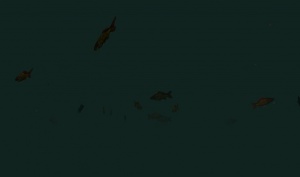Func fish pool: Difference between revisions
Jump to navigation
Jump to search
 Bug:Killing the func_fish_pool does not delete the fish, the fish entity can be killed as a workaround. [todo tested in ?]
Bug:Killing the func_fish_pool does not delete the fish, the fish entity can be killed as a workaround. [todo tested in ?]
 Warning:Killing the fish entity before killing the func_fish_pool entity crashes the game, the func_fish_pool entity must be killed first.
Warning:Killing the fish entity before killing the func_fish_pool entity crashes the game, the func_fish_pool entity must be killed first.
(Fixed up the page.) |
Gatelych83 (talk | contribs) No edit summary |
||
| Line 11: | Line 11: | ||
{{KV Parentname}} | {{KV Parentname}} | ||
{{KV|World model|studio|The fish model.}} | {{KV|World model (model)|studio|The fish model.}} | ||
{{KV|Fish Count|integer|Number of fish in this pool.}} | {{KV|Fish Count (fish_count)|integer|Number of fish in this pool.}} | ||
{{KV|Max Range|float|How far away a fish can wander, in units. Maximum is 255 units.}} | {{KV|Max Range (max_range)|float|How far away a fish can wander, in units. Maximum is 255 units.}} | ||
{{KV Origin}} | {{KV Origin}} | ||
Revision as of 08:16, 4 September 2020
Entity description
It creates a school of interactive fish that swim near this entity.
Keyvalues
- Name (targetname) <string>
- The name that other entities refer to this entity by, via Inputs/Outputs or other keyvalues (e.g.
parentnameortarget).
Also displayed in Hammer's 2D views and Entity Report. - See also: Generic Keyvalues, Inputs and Outputs available to all entities
Parentname:
- Parent (parentname) <targetname>
- Specifies a movement parent. An entity will maintain its initial offset from its parent. An attachment point can be added to the end of the name, separated by a comma.
- World model (model) ([todo internal name (i)]) <model path>
- The fish model.
- Max Range (max_range) ([todo internal name (i)]) <float>
- How far away a fish can wander, in units. Maximum is 255 units.
Origin:
- Origin (X Y Z) (origin) <origin>
- The position of this entity's center in the world. Rotating entities typically rotate around their origin.
